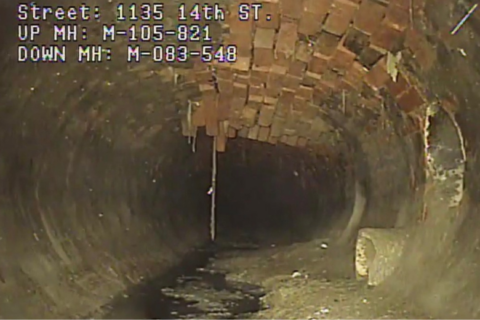The District’s troubled crime lab likely won’t be cleared to analyze some evidence, such as DNA, until 2024 at the earliest.
That’s according to interim D.C. Department of Forensic Sciences Director Anthony Crispino, who appeared before a D.C. Council committee Wednesday to provide an update on the current state of the agency nearly two years after it lost its accreditation to perform forensic casework amid allegations of misconduct and errors centered in the lab’s Firearms Examination Unit.
The timeline now is for the D.C. agency to apply for reaccreditation with the ANSI National Accreditation Board covering the lab’s DNA and chemistry unit by late this spring or early summer.
“Fingers crossed, absent any unforeseen circumstances, we hope to be able to put in the application in late spring, early summer,” Crispino said.
However, because of the time needed for the accrediting board to assemble a team of experts to review the D.C. lab’s procedures, the entire process is expected to take at least six months before the lab would receive accreditation, if successful — meaning it would be early 2024 before the agency would be cleared to analyze evidence.
The timeline has shifted before. Last year, testifying before the same committee, Crispino said officials had hoped to have the lab’s DNA and chemistry unit reaccredited by this spring. Shortly after taking the helm of the agency in May 2021, Crispino said he hoped to see the agency reaccredited by early 2022.
It could be even longer for the lab’s other units to be cleared to handle evidence again — if at all.
There’s no timeline for the agency’s Latent Fingerprint Unit to reapply for accreditation. Recently, as part of a review of the fingerprint unit, the agency disclosed that a majority of the eight-person unit failed proficiency exams.
The agency’s former Firearms Examination Unit was disbanded entirely in September 2021, with nearly a dozen people laid off, and there’s no indication if the unit will be restored. Speaking Wednesday, Crispino hesitated to say the unit was permanently disbanded, but said there were no plans to reconstitute it any time in the near future.
“There were a lot of systemic issues that came out of that unit that led to the loss of accreditation, that will take a significant amount of resources and time to address,” he said.
For now, the Bureau of Alcohol, Tobacco, Firearms and Explosives is conducting some ballistics work, such as performing test fires and uploading images of bullets and casings into a national digital database. The ATF does not, however, perform direct analysis of ballistics evidence.
Backlog of evidence
A backlog of other evidence is also piling up.
The lab is sending DNA evidence to private labs for analysis, but DFS is also still unable to upload DNA samples into the national CODIS database, which is used by investigators to link cases involving the same DNA profiles.
For that step, which can’t be performed by private labs, DFS requires the help of state forensic labs in Wyoming and Connecticut. However, the extra steps have slowed down the uploading of DNA profiles to CODIS — potentially hamstringing ongoing investigations in the District.
According to figures presented during the council, there were some 650 DNA profiles that had yet to be uploaded into the database.
“I would call that a significant backlog,” said Ward 6 Council member Charles Allen, the former chairman of the committee, and the architect of legislation passed last year seeking to overhaul the agency.
“Obviously, the concern is, you know, we leave kind of the hits on the table, and from the impact on sexual assault victims and their overall public safety system,” Allen said. “It’s concerning, I know, you share that concern, I just think we want to make sure that we are doing everything possible to increase the ability to get those uploaded.”
Concern about costs
Ward 2 Council member Brooke Pinto said she was concerned about the cost to District taxpayers to continue outsourcing the lab’s forensic casework.
“I think it’s fair to say we are on the same team and hoping to regain accreditation,” she told Crispino. “But I’m worried that it seems as though there’s a pattern of continued outsourcing of much of the work.”
She noted the agency — which currently employs about 240 people — received an extra $1.5 million in the fiscal 2023 budget to have private labs analyze D.C. evidence. Crispino said the additional funding has largely covered the costs of outsourcing, but that costs would likely increase in the future.
In a statement to WTOP after the hearing, Pinto said, “The Department of Forensic Sciences’ lack of accreditation is costing the taxpayer due to DFS outsourcing much needed testing and has led to unacceptable delays. DFS must move expeditiously to regain accreditation and I will be working with the agency to ensure that needed reforms happen in a manner that will help it regain its accreditation and lead to long-term success.”
Problems in fingerprint unit
Two years after the lab’s loss of accreditation, there are still indications of persistent, deep-rooted problems in the lab’s fingerprint unit.
Late last year, the agency informed the committee that five out of eight DFS latent fingerprint examiners, who had recently undergone a skills assessment, were found to “need significant improvement.”
Last year, a 2021 review of about 45 case reports from the same unit found that in 42 of the 45 cases studied, prints were improperly evaluated. (Crispino chalked that up to the examiners being “overly conservative”).
Even earlier, a report commissioned by the mayor’s office uncovered paperwork from 2012 showing that only two of the unit’s 11 members passed a skills test when the agency was first created.
Allen credited Crispino and the agency for “proactively releasing” the recent information about the failed proficiency tests, saying it “goes a good way to helping reestablish … trust and credibility.”
Asked whether it had any impact on getting the agency reaccredited, Crispino said no, pointing to the fact that the agency is prioritizing getting the DNA and chemistry cleared to start working again first.
Crispino said the agency is now working with a consultant to develop “tailored curriculums” for each of the fingerprint analysts and will then seek to individually certify each analyst through the International Association for Identification forensic organization.
‘Couldn’t be prouder’
Crispino said the agency has implemented a number of recommendations put forward by the independent team of experts commissioned by D.C. Mayor Muriel Bowser, which called for a wholesale overhaul of the agency in a December 2021 report.
The agency has hired an interim deputy chief forensic science officer and is working with a forensic consulting organization called FACT to rebuild the D.C.’s entire quality assurance systems.
“I couldn’t be prouder of the work the DFS has done under my leadership. I am confident that DFS will deliver even greater returns for the residents and visitors of the District of Columbia,” Crispino said, thanking agency staff and the mayor.
Last year, the D.C. Council gave unanimous approval to legislation seeking to revamp the lab.
The “Restoring Trust and Credibility to Forensic Sciences” restructures the crime lab — removing it from the direct control of the mayor — and strengthen an internal oversight board responsible for investigating errors and allegations of misconduct.
Testifying Wednesday before Pinto’s committee, Dr. Jeanne Jordan, the current chair of the agency’s Science Advisory Board, said the body has only met twice since the lab lost its accreditation because it lacked enough members to legally meet under D.C. law.
Under the overhaul legislation, which requires the agency director to be a scientist, Crispino is ineligible to serve as the permanent director.
Appointed by Bowser in late May 2021, Crispino has been leading the agency on an interim basis far longer than D.C. law allows.
WTOP’s Megan Cloherty contributed to this report.








